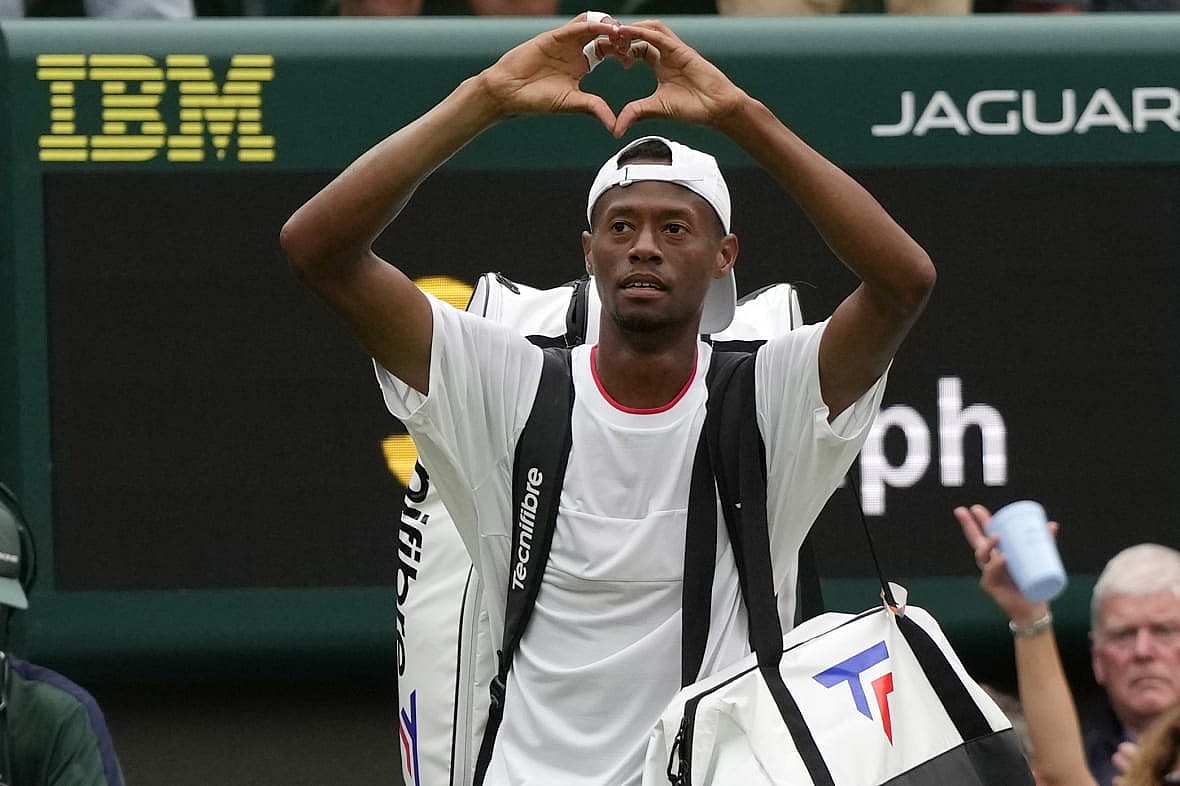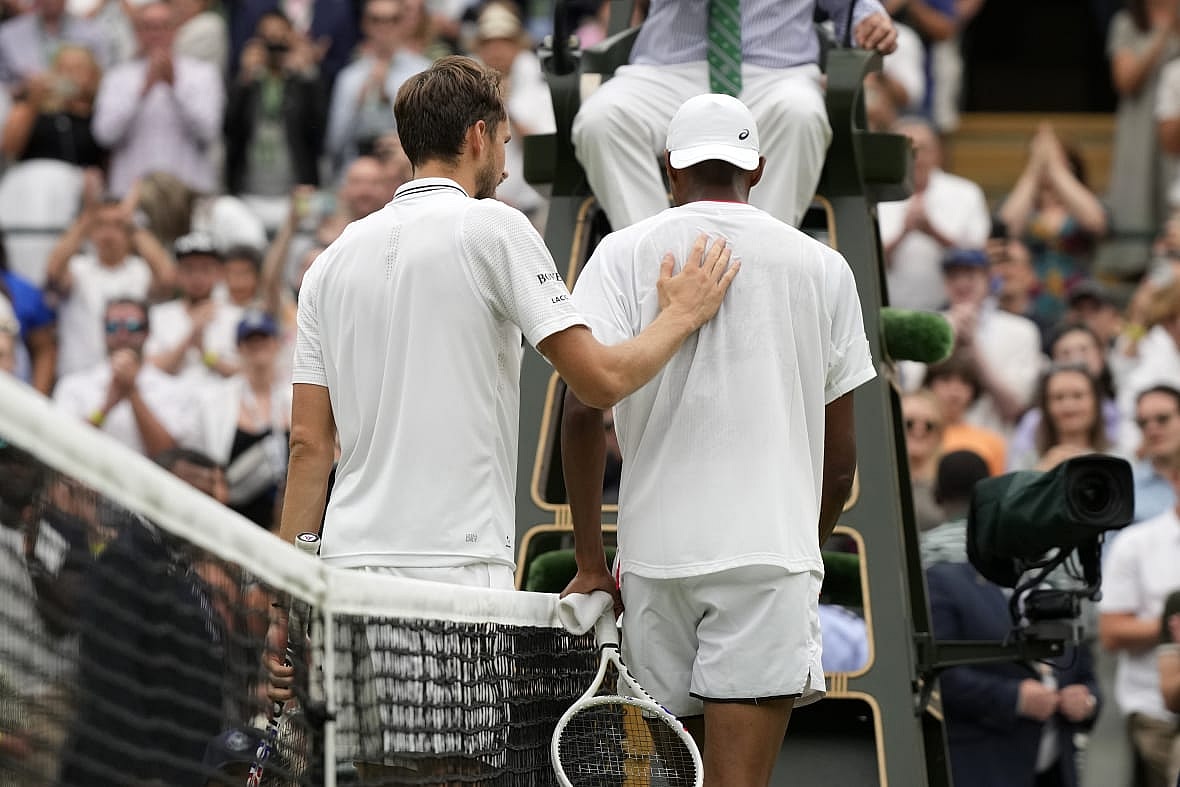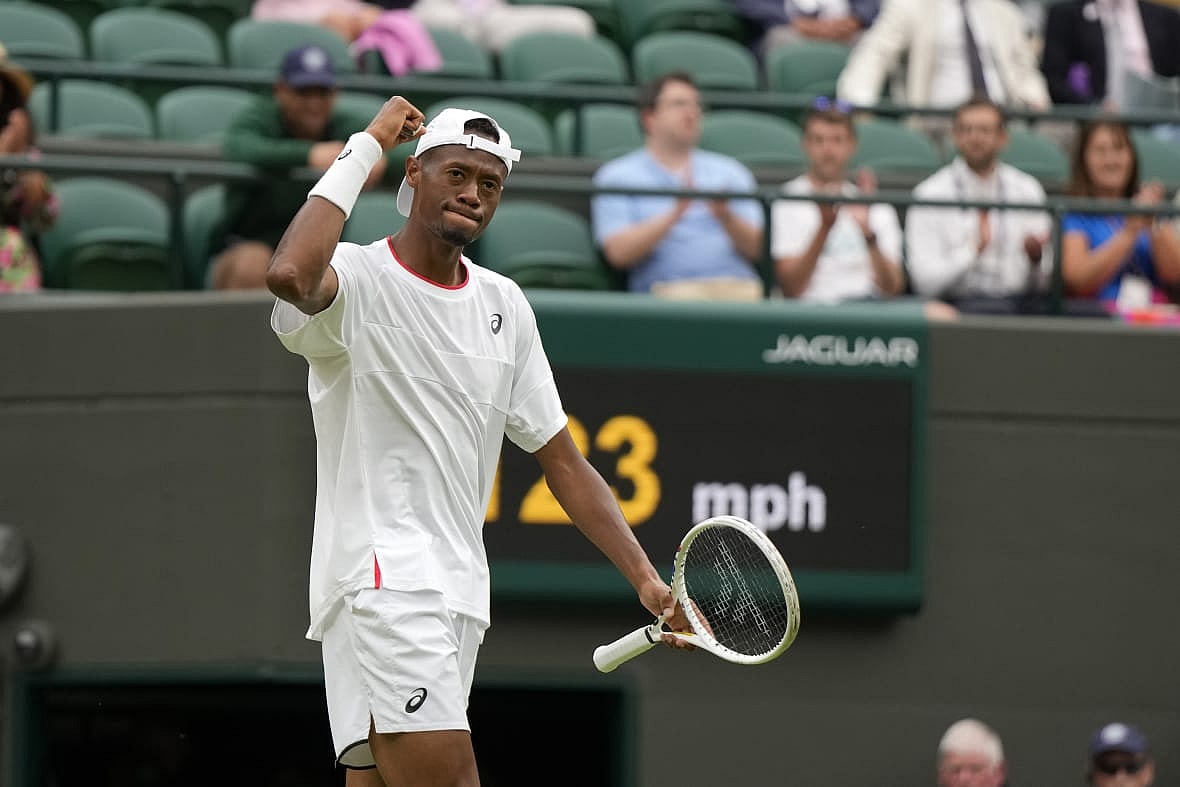WIMBLEDON, England (AP) — Chris Eubanks woke up Wednesday morning ahead of playing for a berth in the final four at Wimbledon against 2021 U.S. Open champion Daniil Medvedev and, first thing, like so many of us, reached for his phone to see what the buzz was about on Twitter.
“It was just constant me,” Eubanks said. “I was just like, ‘This is so weird.’ I looked at it. I was like, ‘Man, I’m really about to play a Grand Slam quarterfinal today. This is cool.’”
He took less than 10 minutes to let that sink in, then, as the 27-year-old American who captivated the crowds at the All England Club and many folks back home put it, “was able to lock back in.” And so he pushed Medvedev the distance, taking a two-sets-to-one lead before running out of aces and energy.

Basking in the roars from the stands at No. 1 Court, the unseeded Eubanks came within four points of winning to extend his deepest run, by far, at a major tournament before Medvedev pulled away for a 6-4, 1-6, 4-6, 7-6 (4), 6-1 victory to reach the Wimbledon semifinals for the first time.
“It’s like his level elevated into the fifth,” Eubanks said, “where I had a little bit of a drop.”
If Medvedev was unsteady for a bit, perhaps distracted by a back-and-forth with the chair umpire over a stray ball that headed toward the stands, he gathered himself well.
“Happy that I managed to put myself back together. There was a moment in the match I started just losing kind of everything — the focus, the momentum of the match,” said the No. 3-seeded Medvedev, who will face No. 1 Carlos Alcaraz in the semifinals on Friday. “When I started losing it, I was like, ‘All right, what’s happening? Why is it happening like this?’”
Alcaraz’s 7-6 (3), 6-4, 6-4 victory over No. 6 Holger Rune at Centre Court was the first men’s quarterfinal at Wimbledon in the Open era, which dates to 1968, with two players who are not yet 21. Both Spain’s Alcaraz, who won last year’s U.S. Open, and Denmark’s Rune are 20.
When Alcaraz smacked a backhand return winner to seal the first set, he threw threw his head back and screamed. He paused for a second and screamed again. He strutted to the sideline, head held high, and yelled, then got to the sideline and yelled “Vamos! Vamos!”
“It was nerves. Tension. It was everything,” Alcaraz explained later.
In the women’s quarterfinals, Ons Jabeur eliminated defending champion Elena Rybakina 6-7 (5), 6-4, 6-1 in a rematch of last year’s title match, and reigning Australian Open champion Aryna Sabalenka defeated No. 25 seed Madison Keys 6-2, 6-4.
Jabeur, known more for her spins and slices and variety than her power, actually opted for trading big swings with Rybakina, whose game is built that way.
“If you want to hit hard,” Jabeur said, “I’m ready to hit hard, too.”

No. 6 Jabeur plays No. 2 Sabalenka on Thursday, when the other semifinal will be between unseeded players Elina Svitolina and Marketa Vondrousova. None of the four remaining women has won Wimbledon; Sabalenka is the only one who already owns a major trophy.
Sabalenka, who is from Belarus, and Medvedev, who is from Russia, were banned from the All England Club a year ago, along with every player representing those two countries, over the invasion of Ukraine. The war continues, but Russians and Belarusians were allowed back this time.
If Alcaraz’s victory was altered by the first-set tiebreaker — “He gained more confidence from that set; I didn’t,” Rune said — Medvedev’s started to tilt midway through the fourth-set tiebreaker.
Eubanks put a forehand in a corner that drew a netted backhand from Medvedev, making it 3-all. Many in the seats rose, cheering wildly, and Eubanks pumped his right fist, staring toward the support.
“The fans,” he would say afterward, “definitely got their money’s worth.”
Medvedev’s take on the way spectators backed Eubanks over the past 1 1/2 weeks, which included wins against No. 5 Stefanos Tsitsipas and No. 12 Cam Norrie: “Maybe his tennis. Maybe he’s underdog.”
Maybe. And maybe Eubanks, who is from Atlanta and was a college All-American at Georgia Tech, enjoyed that 3-all moment in the tiebreaker just a tad too much.
Then again, hard to blame a guy who came into this tournament with a career record of 2-8 at the majors and who never had won an ATP title until the week before Wimbledon began.
So close to moving on, Eubanks faltered. So close to the brink, Medvedev surged, taking four of the following five points and pushing things to a fifth set.
Medvedev smacked a forehand winner. Eubanks sailed a forehand wide. Eubanks pushed a forehand return long. After Eubanks saved one set point with a service winner, he ceded the next by flubbing a forehand volley.

Medvedev, who won 28 of the 30 points he served in that set, shook his racket. He was fully back in the match — and, it turned out, on his way to a win.
“That’s why he is who he is,” Eubanks said, “and that’s why he’s done the things that he’s done in the sport.”
As intimidating a server as the lanky, 6-foot-7 Eubanks might be, Medvedev hit more aces, 28-17. And while Eubanks finished with more winners, 74-52, to raise his tournament total to 321 and break Andre Agassi’s 1992 mark for most winners at a single Wimbledon (since 1977), Medvedev played incredibly cleanly. He only made 13 unforced errors, 42 fewer than Eubanks — although Medvedev questioned the accuracy of his count.
When the match ended, when Eubanks’ wonderful ride was over, he was sent off toward the locker room by a loud and lengthy standing ovation — as his pal, 2022 French Open runner-up Coco Gauff, captured the scene with her phone camera.
Eubanks paused his walk. He turned to all sections of the arena to wave and then put his hands together overhead in the shape of a heart, soaking it all in.
TheGrio is FREE on your TV via Apple TV, Amazon Fire, Roku, and Android TV. Please download theGrio mobile apps today!

